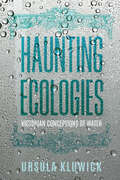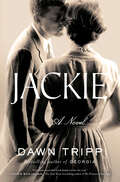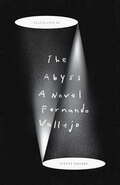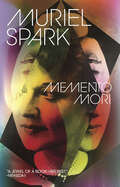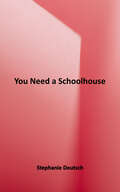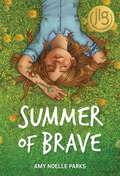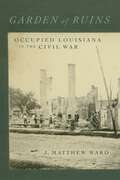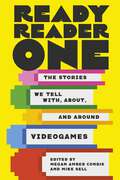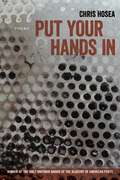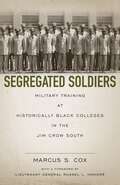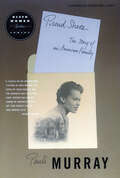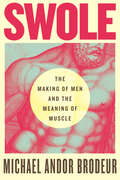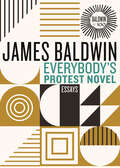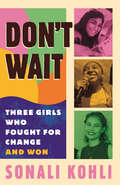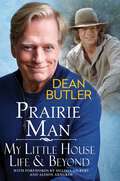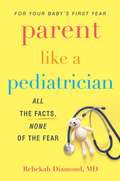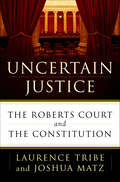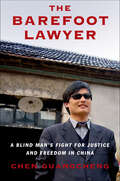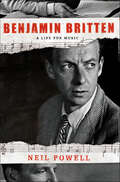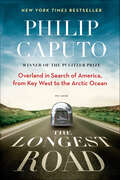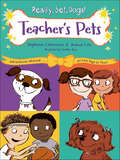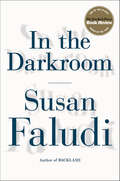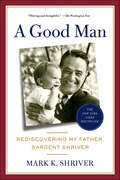- Table View
- List View
Haunting Ecologies: Victorian Conceptions of Water (Victorian Literature and Culture Series)
by Ursula KluwickVictorians&’ views of water and its role in how the social fabric of Victorian Britain was imagined Water matters like few other substances in people&’s daily lives. In the nineteenth century, it left its traces on politics, urban reform, and societal divisions, as well as on conceptualizations of gender roles. Drawing on the methodology of material ecocriticism, Ursula Kluwick&’s Haunting Ecologies argues that Victorian Britons were keenly aware of aquatic agency, recognizing water as an active force with the ability to infiltrate bodies and spaces. Kluwick reads works by canonical writers such as Braddon, Dickens, Stoker, and George Eliot alongside sanitary reform discourse, court cases, journalistic articles, satirical cartoons, technical drawings, paintings, and maps. This wide-ranging study sheds new light on Victorian-era anxieties about water contamination as well as on how certain wet landscapes such as sewers, rivers, and marshes became associated with moral corruption and crime. Applying ideas from the field of blue humanities to nineteenth-century texts, Haunting Ecologies argues for the relevance of realism as an Anthropocene form.
Jackie: A Novel
by Dawn TrippIn this mesmerizing novel about Jacqueline Kennedy Onassis, acclaimed author Dawn Tripp has crafted an intimate story of love and power, family and tragedy, loss and reinvention. &“A brilliant, beautiful book [that] touches the soul.&”—Chris Bohjalian, New York Times bestselling author of The Princess of Las VegasThe world has divided my life into three:Life with JackLife with OnassisLife as a woman who goes to work because she wants to.My life is all of these things, and it is none of these things. They continue to miss what&’s right in front of them. I love books. I love the sea. I love horses. Children. Art. Ideas. History. Beauty. Because beauty blows us open to wonder.Even the beauty that breaks your heart.Jackie is the story of a woman—deeply private with a nuanced, formidable intellect—who forged a legacy out of grief and shaped history even as she was living it. It is the story of a love affair, a complicated marriage, and the fracturing of identity that comes in the wake of unthinkable violence.When Jackie meets the charismatic congressman Jack Kennedy in Georgetown, she is twenty-one and dreaming of France. She has won an internship at Vogue. Kennedy, she thinks, is not her kind of adventure: &“Too American. Too good-looking. Too boy.&” Yet she is drawn to his mind, his humor, his drive. The chemistry between them ignites. During the White House years, the love between two independent people deepens. Then, a motorcade in Dallas: &“Three and a half seconds—that&’s all it was—a slivered instant between the first shot, which missed the car, and the second, which did not. . . . A hypnotic burst of sunlight off her bracelet as she waved.&”This vivid, exquisitely written novel is at once a captivating work of the imagination and a window into the world of a woman who led many lives: Jackie, Jacks, Jacqueline, Miss Bouvier, Mrs. Kennedy, Jackie O.
The Abyss: A Novel
by Fernando VallejoFinally, the Colombian Fernando Vallejo’s masterpiece, The Abyss, is available in English in a stunning translation by Yvette Siegert Winner of the Rómulo Gallego Prize, The Abyss is a caustic masterwork of incredible power and force, an unforgettable autobiographical work of queer fiction. The novel tells about the demise of a crumbling house in Medellín, Colombia. Fernando, a writer, visits his brother Darío, who is dying of AIDS. Recounting their wild philandering and trying to come to terms with his beloved brother’s inevitable death, Fernando rants against the political forces that cause so much suffering. Vallejo is the heir to Céline, Thomas Paine, and Machado de Assis. He hurls vitriolic, savagely funny insults at his country (“I wipe my ass with the new Constitution of Colombia”) and at his mother (“the Crazy Bitch”) who has given birth to him and his many siblings. Within this firestorm of pain, Fernando manages to get across much beauty and truth: that all love is painful and washed in pure sorrow. He loves his sick brother and the family’s Santa Anita farm (the lost paradise of his childhood where azaleas bloomed); and he even loves his country, now torn to shreds. Always, in this savage masterpiece about loss—as if in the eye of Vallejo’s hurricane of talent—we are in the curiously comforting workings of memory and of the writing process itself, as, recollecting time, it offers immortality.
Memento Mori
by Muriel SparkPoignant, hilarious, and spooky, Memento Mori addresses old age In late 1950s London, something uncanny besets a group of elderly friends: an insinuating voice on the telephone reminds each: Remember you must die. Their geriatric feathers are soon thoroughly ruffled, and many an old unsavory secret is dusted off.
You Need a Schoolhouse: Booker T. Washington, Julius Rosenwald, and the Building of Schools for the Segregated South
by Stephanie DeutschBooker T. Washington, the founder of the Tuskegee Institute, and Julius Rosenwald, the president of Sears, Roebuck, and Company, first met in 1911 at a Chicago luncheon. By charting the lives of these two men both before and after the meeting, Stephanie Deutsch offers a fascinating glimpse into the partnership that would bring thousands of modern schoolhouses to African American communities in the rural South in the era leading up to the civil rights movement. <P><P>Trim and vital at just shy of fifty, Rosenwald was the extraordinarily rich chairman of one of the nation's largest businesses, interested in using his fortune to do good not just in his Jewish community but also to promote the well-being of African Americans. Washington, though widely admired, had weathered severe crises both public and private in his fifty-six years. He had dined with President Theodore Roosevelt and drunk tea with Queen Victoria, but he had also been assaulted on a street in New York City. He had suffered personal heartbreak, years of overwork, and the discouraging knowledge that, despite his optimism and considerable success, conditions for African Americans were not improving as he had assumed they would. From within his community, Washington faced the bitter charge of accommodationism that haunts his legacy to this day. <P><P>Despite their differences, the two men would work together well and their collaboration would lead to the building of five thousand schoolhouses. By the time segregation ended, the "Rosenwald Schools" that sprang from this unlikely partnership were educating one-third of the South's African American children. These schoolhouses represent a significant step in the ongoing endeavor to bring high-quality education to every child in the United States--an ideal that remains to be realized even today.
Summer of Brave
by Amy Noelle ParksTwelve-year-old Lilla Baxter-Willoughby doesn’t lie. She’s just a little bit…selective. To keep her parents happy, Lilla hides how much she hates moving back and forth between their houses, and she stomps down her doubts about that elite high school they’re pushing her toward. To keep peace with her best friend Vivi, Lilla doesn’t share that she got the junior camp counselor job that Vivi wanted. And even though—no, especially because—he seems into it, Lilla does not tell the boy she grew up with about all the little sparks that flared up inside her the day she noticed his Suddenly Adorable Freckles. So when Vivi dares Lilla to start telling the truth as part of their Summer of Brave, Lilla hesitates. Because if she says out loud what she really wants, her whole life might crash down around her. And she doesn’t need that. Except maybe she does.
Garden of Ruins: Occupied Louisiana in the Civil War (Conflicting Worlds: New Dimensions of the American Civil War)
by J. Matthew WardJ. Matthew Ward’s Garden of Ruins serves as an insightful social and military history of Civil War–era Louisiana. Partially occupied by Union forces starting in the spring of 1862, the Confederate state experienced the initial attempts of the U.S. Army to create a comprehensive occupation structure through military actions, social regulations, the destabilization of slavery, and the formation of a complex bureaucracy. Skirmishes between Union soldiers and white civilians supportive of the Confederate cause multiplied throughout this period, eventually turning occupation into a war on local households and culture. In unoccupied regions of the state, Confederate forces and their noncombatant allies likewise sought to patrol allegiance, leading to widespread conflict with those they deemed disloyal. Ward suggests that social stability during wartime, and ultimately victory itself, emerged from the capacity of military officials to secure their territory, governing powers, and nonmilitary populations. Garden of Ruins reveals the Civil War, state-building efforts, and democracy itself as contingent processes through which Louisianans shaped the world around them. It also illustrates how military forces and civilians discovered unique ways to wield and hold power during and immediately after the conflict.
Ready Reader One: The Stories We Tell With, About, and Around Videogames
by Megan Amber Condis and Mike SellReady Reader One explores the many ways literature depicts, engages with, and imagines videogames and gamers. The diverse group of authors included in this collection take an expansive view of “videogame literature,” with essays that consider written works ranging from life writing to speculative fiction to videogame guides created for the internet. In an age of ever-increasing gamification, in which gaming literacy is important to understanding popular culture and technological power, Ready Reader One examines the role of videogame literature in explaining not only how we play videogames, but how we read and write about them.
Put Your Hands In: Poems (Walt Whitman Award of the Academy of American Poets)
by Chris Hosea"Exactly a century ago, the Armory Show brought European avant-garde art to New York. We are still experiencing its consequences. Among the works on view was Marcel Duchamp's notorious Nude Descending a Staircase, which a derisive critic wanted to rename 'Explosion in a Shingle Factory.' Both titles come to mind as one reads Chris Hosea's Put Your Hands In, which somehow subsumes derision and erotic energy and comes out on top. Maybe that's because 'poetry is the cruelest month,' as he says, correcting T. S. Eliot. Transfixed in midparoxysm, the poems also remind us of Samuel Beckett's line (in Watt): 'The pain not yet pleasure, the pleasure not yet pain.' One feels plunged in a wave of happening that is about to crest."—John Ashbery, from his judge's citation for the Walt Whitman Award
Segregated Soldiers: Military Training at Historically Black Colleges in the Jim Crow South
by Marcus S. CoxIn Segregated Soldiers, Marcus S. Cox investigates military training programs at historically black colleges and universities, and demonstrates their importance to the struggle for civil rights. Examining African Americans' attitudes toward service in the armed forces, Cox focuses on the ways in which black higher education and Reserve Officer Training Corps (ROTC) programs worked together to advance full citizenship rights for African Americans. Educators at black colleges supported military training as early as the late nineteenth century in hopes of improving the social, economic, and political state of black citizens. Their attitudes reflected the long-held belief of many African Americans who viewed military service as a path to equal rights.Cox begins his narrative in the decades following the Civil War, when the movement to educate blacks became an essential element in the effort to offer equality to all African Americans. ROTC training emerged as a fundamental component of black higher education, as African American educators encouraged military activities to promote discipline, upright behavior, and patriotism. These virtues, they believed, would hasten African Americans' quest for civil rights and social progress. Using Southern University -- one of the largest African American institutions of higher learning during the post--World War II era -- as a case study, Cox shows how blacks' interest in military training and service continued to rise steadily throughout the 1950s. Even in the 1960s and early 1970s, despite the growing unpopularity of the Vietnam War, the rise of black nationalism, and an expanding economy that offered African Americans enhanced economic opportunities, support for the military persisted among blacks because many believed that service in the armed forces represented the best way to advance themselves in a society in which racial discrimination flourished. Unlike recent scholarship on historically black colleges and universities, Cox's study moves beyond institutional histories to provide a detailed examination of broader social, political, and economic issues, and demonstrates why military training programs remained a vital part of the schools' missions.
Proud Shoes: The Story of an American Family
by Pauli MurrayFirst published in 1956, Proud Shoes is the remarkable true story of slavery, survival, and miscegenation in the South from the pre-Civil War era through the Reconstruction. Written by Pauli Murray the legendary civil rights activist and one of the founders of NOW, Proud Shoes chronicles the lives of Murray's maternal grandparents. From the birth of her grandmother, Cornelia Smith, daughter of a slave whose beauty incited the master's sons to near murder to the story of her grandfather Robert Fitzgerald, whose free black father married a white woman in 1840, Proud Shoes offers a revealing glimpse of our nation's history.
Swole: The Making of Men and the Meaning of Muscle
by Michael Andor BrodeurFrom a Washington Post critic and self-described meathead: a witty, incisive, poignant exploration of male body image, from the history of the gym to the politics of superheroes to the world of manfluencersMichael Brodeur is a Gen-X gay writer with a passion for bodybuilding and an insatiable curiosity about masculinity--a concept in which many men are currently struggling to find their place. In our current moment, where "manfluencers" on TikTok tease their audiences with their latest videos, where right-wing men espouse the importance of being "alpha," as toxic masculinity and the patriarchy are being rightfully criticized, the nature of masculinity has become murkier than ever.In excavating this complex topic, Brodeur uses the male body as his guide: its role in cultures from the gymnasia of ancient Greece to Walt Whitman's essays on manly health, from the rise of Muscular Christianity in 19th-century America to the swollen superheroes and Arnold Schwarzeneggers of Brodeur's childhood. Interweaving history, cultural criticism, memoir, and reportage, laced with an irrepressible wit, Brodeur takes us into the unique culture centered around men's bodies, probing its limitations and the promise beyond: how men can love themselves while rejecting the aggression, objectification, and misogyny that have for so long accompanied the quest to become swole.
Everybody's Protest Novel: Essays
by James Baldwin"I am completely indebted to Jimmy Baldwin&’s prose. It liberated me as a writer."—Toni MorrisonThis collectible edition celebrates James Baldwin&’s 100th-year anniversary, probing the shortcomings of the American protest novel and the harmful representations of Black identity in film and fictionOriginally published in Notes of a Native Son, the essays "Autobiographical Notes," "Everybody's Protest Novel," "Many Thousands Gone," and "Carmen Jones: The Dark is Light Enough," showcase Baldwin's incisive voice as a social and literary critic.&“Autobiographical Notes&” outlines Baldwin&’s journey as a Black writer and his hesitant transition from fiction to nonfiction. In the following essays, Baldwin explores the Black experience through the lens of popular media, critiquing the ways in which Black characters—in Harriet Beecher Stowe&’s novel Uncle Tom&’s Cabin, Richard Wright&’s novel Native Son, and the 1950s film Carmen Jones—are reduced to digestible caricatures.Everybody&’s Protest Novel: Essays is the first of three special editions in the James Baldwin centennial anniversary series. Through this collection, Baldwin examines the facade of progress present in the novels of Black oppression. These essays showcase Baldwin&’s profound ability to reveal the truth of the Black experience, exposing the failure of the protest novel, and the state of racial reckoning at the dawn of the Civil Rights Movement.
Don't Wait: Three Girls Who Fought for Change and Won
by Sonali KohliFollows the stories of three young women activists of color fighting for some of today&’s most pressing movements of defunding the police, environmental justice, and arts educationGirls of color have always been on the front lines of the fight for equal rights—to vote, to learn, to live—even when they are the last to benefit from the outcomes of their work. In Don&’t Wait, journalist Sonali Kohli follows three teenagers&’ efforts to make their communities safer, healthier places.Don&’t Wait highlights what propelled the teenagers into their activism to their experiences organizing and incorporates Q&As with important lessons from activists who have led the way.The three teen activists include:· Nalleli has lived across the street from an active oil well in South Los Angeles and at age 7, developed serious health problems. Nalleli and her mother take on an oil company and become environmental justice activists.· Kahlila, following the murder of George Floyd and looking to help fight back, becomes involved with the Black Lives Matter movement in Los Angeles and fights to defund school police in one of the largest school police forces in the nation.· Sonia, an accomplished singer grappling with finding an creative outlet in the pandemic, strives to increase access to arts education in schools across California.As the young women transition from teen to adult activists, Don&’t Wait reflects on the powerful lessons they&’ve learned in their activism while building movements in their communities that will continue to live on as they move forward.
Prairie Man: My Little House Life & Beyond
by Dean ButlerCelebrating its 50th anniversary and still airing in the U.S. and around the world, Little House on the Prairie is one of the most cherished family dramas in television history, and this smart, candid memoir from beloved star Dean &“Almanzo&” Butler, who played Laura &“Half-Pint&” Ingalls&’ eventual husband, is a must-read for fans, filled with insider stories and anecdotes. Cast just before his twenty-third birthday, Dean Butler joined Little House on the Prairie halfway through its run, gaining instant celebrity and fans&’ enduring affection.Ironically, when the late, great Michael Landon remarked that Little House would outlive everyone involved in making it, Butler deemed it unlikely. Yet for four decades and counting, Butler has been defined in the public eye as Almanzo Wilder—a role he views as the great gift of his life. Butler had been cast as a romantic lead before, notably in the made-for-TV movie of Judy Blume&’s Forever, opposite Stephanie Zimbalist. But Little House was, and remains, one of the most treasured shows in television history. As the eventual husband of Laura &“Half-pint&” Ingalls—and the man who would share actress Melissa Gilbert&’s first real-life romantic kiss—Butler landed as a central figure for the show&’s devoted fans. Now, with wit and candor, Butler recounts his passage through the Prairie, sharing stories and anecdotes of the remarkable cast who were his on-screen family. But that was merely the beginning of a diverse career that includes Broadway runs and roles on two other classic shows—Moondoggie in The New Gidget and Buffy&’s ne&’er-do-well father, Hank, in Buffy the Vampire Slayer. Coming of age during a golden era of entertainment, Butler has evolved along with it, and today enjoys success and fulfillment as a director and producer—notably of NBC Golf&’s Feherty—while remaining deeply loyal to Little House. The warmth, heart, and decency that fans of Laura and Almanzo fell in love with on Little House echo through this uplifting memoir, a story, in Butler&’s words, about &“good luck, good television, and the very good—if gloriously imperfect—people who made it so.&”
Broadway Butterfly: The Lady Gangster of Jazz Age New York
by Anthony M. DeStefanoThe definitive book on one of the most notorious murders in Jazz Age New York history, that of Vivian Gordon, the high-end escort, con artist, and blackmailer connected to gangsters like &“Legs&” Diamond and Arnold Rothstein, whose death exposed the dark underbelly of police corruption throughout the city—from the Pulitzer Prize and Emmy Award-winning investigative journalist who is one of the foremost Mafia experts writing today. Like so many other pretty butterflies, Indiana-born Vivian Gordon fluttered to New York in 1920 looking for fame and fortune. Before long, the flame-haired chorus girl parlayed her youth, beauty, and ambition into more profitable means as a tough and glamorous symbol of Prohibition-era excess. She was a speakeasy owner, blackmailer, high-end escort, extortionist, racketeer, and con woman. But given her dangerously intimate associations—from ruthless underworld gangsters to corrupt high-ranking city officials—Vivian was also a woman who knew too much and who rightfully feared for her life. On February 26, 1931, Vivian&’s bludgeoned and garroted body was found dumped in Van Cortland Park in the Bronx. Now, in the first in-depth biography of its kind, Pulitzer Prize and Emmy Award-winning journalist Anthony M. DeStefano unravels her tumultuous life and the headline-making murder that became an obsession for many, including then-Governor Franklin Delano Roosevelt. The evidence Vivian left behind was damning: a diary with more than three-hundred names implicating powerful officials, philanthropists, businessmen, and every major gangland figure in collusion and corruption. The investigation eventually resulted in the career-endinginvestigation of James &“Jimmy&” Walker, disgraced mayor of New York City. Ultimately, Broadway Butterfly finally finds a place in history for Vivian, a woman with a rare legacy in gangster lore, whose demise was as tragically inevitable as the brutality of the city&’s demimondeduring Prohibition.
Parent Like a Pediatrician: All the Facts, None of the Fear
by Rebekah DiamondRebekah Diamond, M.D., the pediatrician, working mom, and parent advocate trusted by Parents magazine and NBC for her adept advice, expertly guides you through the noise to share her fresh, inclusive, sensible, no-nonsense take on making the right choices when it comes the first 12 months of your child's life.Becoming a new parent in the age of online advice can be a minefield of confusion, worries, and fears amplified by myths, misinformation, and too much information. As an experienced pediatrician, Rebekah Diamond is deeply grounded in a fact-based understanding of child healthcare. As a mother, she also understands that the accepted rules aren't always the solution to the challenges of nurturing a healthy new baby. But neither is the overload of relatable but often dangerously misleading information bombarding parents. So how do you trust yourself to make the best decisions for your child? With authoritative up-to-date research and real-world advice on the myriad obstacles facing moms, dads, and caregivers, Dr. Diamond unpacks the whys behind the facts to empower your best parental instincts. From safe-sleep guidelines, breast feeding, and binky addiction to sensory developmental activities, baby products, and the final—and 100% evidence-based—word on the vaccination debate, Dr. Diamond helps parents cultivate the clarity and sound decisions you need to lessen the anxiety (for parent and baby) around what should be the joyful, connecting early months of life."Parenting can be nerve-racking, even for the parents who feel prepared and "ready." The truth is, no one is completely ready or knows the answers to every potential problem or situation that arises in a child's life…. Parent Like a Pediatrician has the capability to put a pregnant or new mom at ease." —Portland Book Review
Uncertain Justice: The Roberts Court and the Constitution
by Laurence Tribe Joshua MatzHarvard Law School scholars Laurence Tribe and Joshua Matz reveal how Chief Justice John Roberts is shaking the foundation of our nation’s laws in Uncertain Justice: The Roberts Court and the Constitution.From Citizens United to its momentous rulings regarding Obamacare and gay marriage, the Supreme Court under Chief Justice John Roberts has profoundly affected American life. Yet the court remains a mysterious institution, and the motivations of the nine men and women who serve for life are often obscure. Now, in Uncertain Justice, Laurence Tribe and Joshua Matz show the surprising extent to which the Roberts Court is revising the meaning of our Constitution.Political gridlock, cultural change, and technological progress mean that the court’s decisions on key topics—including free speech, privacy, voting rights, and presidential power—could be uniquely durable. Acutely aware of their opportunity, the justices are rewriting critical aspects of constitutional law and redrawing the ground rules of American government. Tribe—one of the country’s leading constitutional lawyers—and Matz dig deeply into the court’s rulings, stepping beyond tired debates over judicial “activism” to draw out hidden meanings and silent battles. The undercurrents they reveal suggest a strikingly different vision for the future of our country, one that is sure to be hotly debated.Filled with original insights and compelling human stories, Uncertain Justice illuminates the most colorful story of all—how the Supreme Court and the Constitution frame the way we live.“Marvelous…Tribe and Matz’s insights are illuminating…. [They] offer well-crafted overviews of key cases decided by the Roberts Court … [and] chart the Supreme Court’s conservative path, clarifying complex cases in accessible terms.”—The Chicago Tribune“Well-written and highly readable…The strength of the book is its painstaking explanation of all sides of the critical cases, giving full voice and weight to conservative and liberal views alike.”—The Washington Post
The Widow's Guide to Sex and Dating: A Novel
by Carole Radziwill"Radziwill's delicious debut novel… is a poignant tale of love and loss."—Publishers Weekly"One of the richest, most deeply satisfying stories I've read in a long time."—BookPage"Carole Radziwill writes like a cross between Sophie Kinsella and Christopher Buckley. Cautiously romantic, unexpectedly moving, and funny!"—Susan SarandonThe Widow's Guide to Sex and Dating is Carole Radziwill's deliciously smart comedy about a famously widowed young New Yorker hell-bent on recapturing a kind of passionate love she never really hadClaire Byrne is a quirky and glamorous 34-year-old Manhattanite and the wife of a famous, slightly older man. Her husband, Charlie, is a renowned sexologist and writer. Equal parts Alfred Kinsey and Warren Beatty, Charlie is pompous yet charming, supportive yet unfaithful; he's a firm believer that sex and love can't coexist for long, and he does little to hide his affairs. Claire's life with Charlie is an always interesting if not deeply devoted one, until Charlie is struck dead one day on the sidewalk by a falling sculpture ... a Giacometti, no less!Once a promising young writer, Claire had buried her ambitions to make room for Charlie's. After his death, she must reinvent herself. Over the course of a year, she sees a shrink (or two), visits an oracle, hires a "botanomanist," enjoys an erotic interlude (or ten), eats too little, drinks too much, dates a hockey player, dates a billionaire, dates an actor (not any actor either, but the handsome movie star every woman in the world fantasizes about dating). As she grieves for Charlie and searches for herself, she comes to realize that she has an opportunity to find something bigger than she had before—maybe even, possibly, love.
The Barefoot Lawyer: A Blind Man's Fight for Justice and Freedom in China
by Chen GuangchengAn electrifying memoir by the blind Chinese activist who inspired millions with the story of his fight for justice and his belief in the cause of freedomIt was like a scene out of a thriller: one morning in April 2012, China's most famous political activist—a blind, self-taught lawyer—climbed over the wall of his heavily guarded home and escaped. Days later, he turned up at the American embassy in Beijing, and only a furious round of high-level negotiations made it possible for him to leave China and begin a new life in the United States.Chen Guangcheng is a unique figure on the world stage, but his story is even more remarkable than anyone knew. The son of a poor farmer in rural China, blinded by illness when he was an infant, Chen was fortunate to survive a difficult childhood. But despite his disability, he was determined to educate himself and fight for the rights of his country's poor, especially a legion of women who had endured forced sterilizations and abortions under the hated "one child" policy. Repeatedly harassed, beaten, and imprisoned by Chinese authorities, Chen was ultimately placed under house arrest. After nearly two years of increasing danger, he evaded his captors and fled to freedom.Both a riveting memoir and a revealing portrait of modern China, The Barefoot Lawyer tells the story of a man who has never accepted limits and always believed in the power of the human spirit to overcome any obstacle.
Benjamin Britten: A Life for Music
by Neil PowellThis spellbinding centenary biography by Neil Powell looks at the music, the life, and the legacy of the greatest British composer of the twentieth centuryBenjamin Britten was born on November 22, 1913, in the East Suffolk town of Lowestoft. Displaying a passion and proficiency for music at an early age, to the delight of his mother, Edith, a talented amateur musician herself, he began composing music when he was only five years old. After studying at the Royal College of Music, Britten went on to write documentary scores for the General Post Office Film Unit, where he met and collaborated with the poet W. H. Auden.Of more lasting importance was Britten's introduction in 1937 to the tenor Peter Pears, who was to become the inspirational center of his emotional and musical life. Their partnership lasted nearly four decades, during a dangerous time when homosexuality was illegal in England. Conscientious objectors, Britten and Pears followed Auden to America before the war began in 1939. While there, they joined the extraordinary Brooklyn ménage of George Davis, Louis MacNeice, and Paul Bowles.Eventually intense homesickness, provoked in part by George Crabbe's poem "Peter Grimes," drove the pair home to East Anglia in 1942 and gave Britten the inspiration for his finest opera. Throughout his career, Britten did not want modern music to be just for "the cultured few" and instead always composed his music to be "listenable-to." The shared quotidian lives of Britten and Pears unfold in this intimate biography and the story of two men who created a truly remarkable legacy.
The Longest Road: Overland in Search of America, from Key West to the Arctic Ocean
by Philip CaputoIn The Longest Road, one of America's most respected writers takes an epic journey across America, Airstream in tow, and asks everyday Americans what unites and divides a country as endlessly diverse as it is large.Standing on a wind-scoured island off the Alaskan coast, Philip Caputo marveled that its Inupiat Eskimo schoolchildren pledge allegiance to the same flag as the children of Cuban immigrants in Key West, six thousand miles away. And a question began to take shape: How does the United States, peopled by every race on earth, remain united? Caputo resolved that one day he'd drive from the nation's southernmost point to the northernmost point reachable by road, talking to everyday Americans about their lives and asking how they would answer his question.So it was that in 2011, in an America more divided than in living memory, Caputo, his wife, and their two English setters made their way in a truck and classic trailer (hereafter known as "Fred" and "Ethel") from Key West, Florida, to Deadhorse, Alaska, covering 16,000 miles. He spoke to everyone from a West Virginia couple saving souls to a Native American shaman and taco entrepreneur. What he found is a story that will entertain and inspire readers as much as it informs them about the state of today's United States, the glue that holds us all together, and the conflicts that could cause us to pull apart.
Teacher's Pets (Ready, Set, Dogs! #2)
by Stephanie Calmenson Joanna ColeIn Cole Calmenson's Teacher's Pets, Kate and Lucie are best friends who love, love, love DOGS. But just because they can't have dogs of their own doesn't mean they can't MAGICALLY turn into them!The FURRY ADVENTURES continue in this CHARMING series when Kate and Lucie find a substitute teacher in their class. Mr. Z makes goofy jokes and has the class going hog wild as he teaches about animal communication. At the same time, mean Darleen makes fun of Kate and Lucie's friendship. Luckily, once Kate and Lucie slap HIGH FIVES and say the special words, they turn into dogs and find a way to save the day. They even make a new friend in the process!
In the Darkroom
by Susan FaludiPULITZER PRIZE FINALISTONE OF THE NEW YORK TIMES BOOK REVIEW'S 10 BEST BOOKS OF THE YEARWINNER OF THE KIRKUS PRIZEFrom the Pulitzer Prize-winning journalist and bestselling author of Backlash, comes In the Darkroom, an astonishing confrontation with the enigma of her father and the larger riddle of identity consuming our age.“In the summer of 2004 I set out to investigate someone I scarcely knew, my father. The project began with a grievance, the grievance of a daughter whose parent had absconded from her life. I was in pursuit of a scofflaw, an artful dodger who had skipped out on so many things—obligation, affection, culpability, contrition. I was preparing an indictment, amassing discovery for a trial. But somewhere along the line, the prosecutor became a witness.” So begins Susan Faludi’s extraordinary inquiry into the meaning of identity in the modern world and in her own haunted family saga. When the feminist writer learned that her 76-year-old father—long estranged and living in Hungary—had undergone sex reassignment surgery, that investigation would turn personal and urgent. How was this new parent who identified as “a complete woman now” connected to the silent, explosive, and ultimately violent father she had known, the photographer who’d built his career on the alteration of images? Faludi chases that mystery into the recesses of her suburban childhood and her father’s many previous incarnations: American dad, Alpine mountaineer, swashbuckling adventurer in the Amazon outback, Jewish fugitive in Holocaust Budapest. When the author travels to Hungary to reunite with her father, she drops into a labyrinth of dark histories and dangerous politics in a country hell-bent on repressing its past and constructing a fanciful—and virulent—nationhood. The search for identity that has transfixed our century was proving as treacherous for nations as for individuals. Faludi’s struggle to come to grips with her father’s metamorphosis takes her across borders—historical, political, religious, sexual--to bring her face to face with the question of the age: Is identity something you “choose,” or is it the very thing you can’t escape?
A Good Man: Rediscovering My Father, Sargent Shriver
by Mark K. ShriverIn this intimate portrait of an extraordinary father-son relationship, Mark K. Shriver discovers the moral principles that guided his legendary father and applies them to his own lifeWhen Sargent "Sarge" Shriver—founder of the Peace Corps and architect of President Johnson's War on Poverty—died in 2011 after a valiant fight with Alzheimer's, thousands of tributes poured in from friends and strangers worldwide. These tributes, which extolled the daily kindness and humanity of "a good man," moved his son Mark far more than those who lauded Sarge for his big-stage, headline-making accomplishments. After a lifetime searching for the path to his father's success in the public arena, Mark instead turns to a search for the secret of his father's joy, his devotion to others, and his sense of purpose. Mark discovers notes and letters from Sarge; hears personal stories from friends and family that zero in on the three guiding principles of Sarge's life—faith, hope, and love—and recounts moments with Sarge that now take on new value and poignancy. In the process, Mark discovers much about himself, as a father, as a husband, and as a social justice advocate. A Good Man is an inspirational and deeply personal story about a son discovering the true meaning of his father's legacy.
